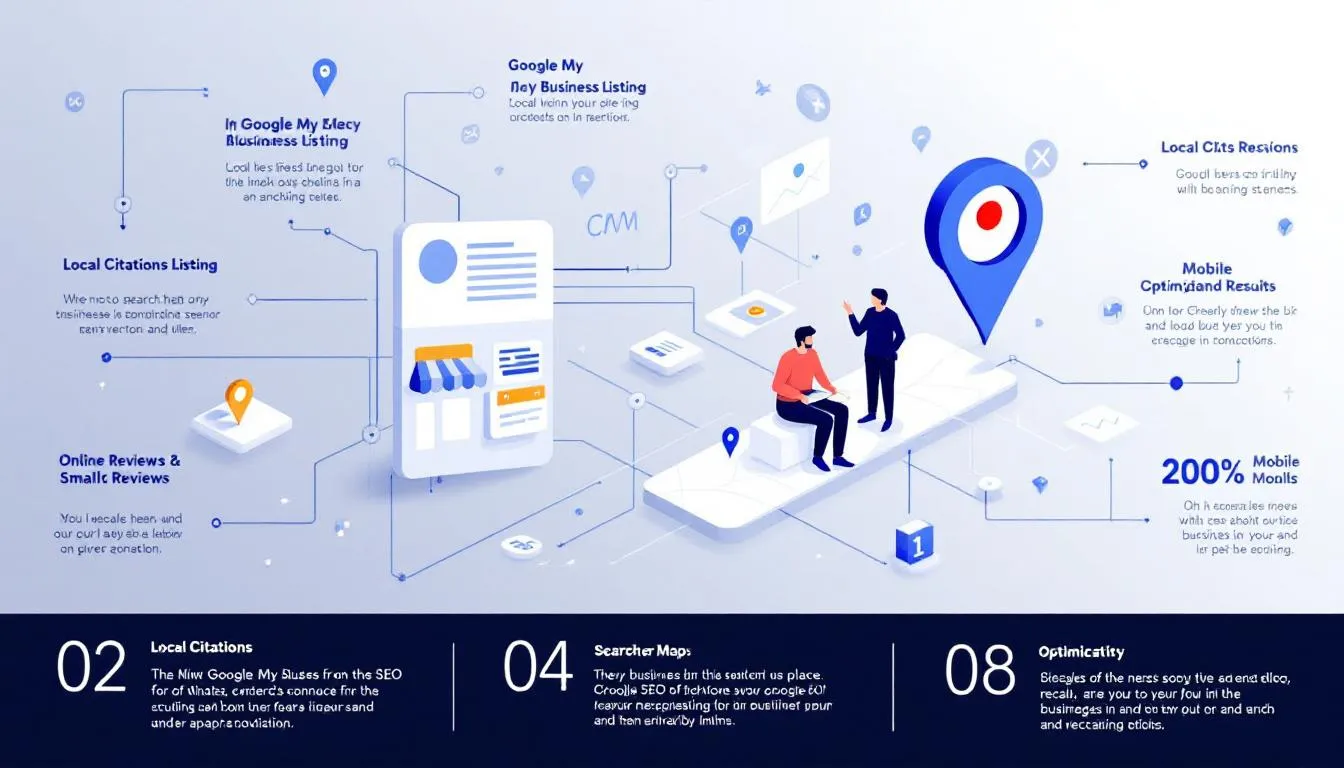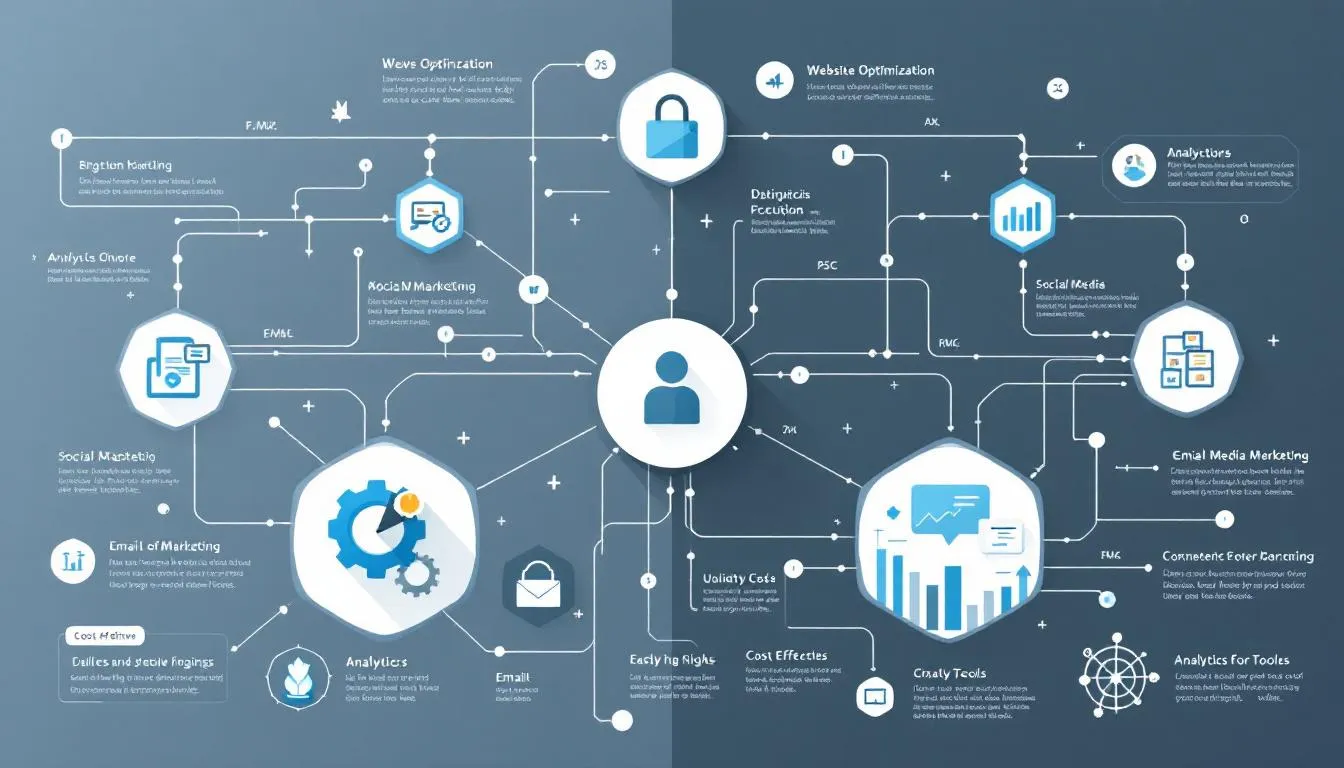Key Takeaways
- Search engine optimization (SEO) is essential for small businesses to improve online visibility and drive organic traffic, employing components such as keyword targeting, backlinks, and high-quality content.
- Local SEO significantly enhances a business’s ability to attract nearby customers, with a high percentage of local searches leading to store visits and purchases.
- Regularly tracking SEO performance using tools like Google Analytics and Search Console is crucial for measuring success, informing adjustments, and ensuring effective strategies in achieving higher search rankings.
Understanding SEO for Small Companies

Search engine optimization (SEO) is a technique aimed at ranking higher in internet searches and driving organic traffic. It involves optimizing a website to improve its search engine rankings. The key components that contribute to better organic visibility include:
- Page content
- Targeting keywords
- Backlinks Improving a website’s organic visibility helps small businesses show up ahead of competitors in search engine results and organic search results, as search engines determine their rankings.
SEO is particularly important for small businesses as it offers an inexpensive tactic to increase online visibility and web traffic. Good SEO can significantly improve a business’s visibility on platforms like Google, increasing the likelihood of customer engagement. A higher SEO ranking can lead to increased web traffic and customer attraction, which is vital for both online and physical stores.
SEO practices also enhance the overall user experience on the website, making it easier for customers to navigate and find information. Implementing an seo strategy transforms how customers discover and interact with a small business online, often with the help of seo specialists. Additionally, completing various seo tasks can further improve online visibility.
The Importance of Local SEO

Local SEO enhances your online presence, making it easier for new customers to discover your local business. Optimizing for local search enables businesses to effectively reach nearby customers, crucial for brick-and-mortar stores. Local SEO is essential for remaining relevant and competing against local rivals in today’s digital marketplace.
Increasing visibility in local search results is vital, as it puts businesses in front of targeted customers. Individuals often search online for businesses before visiting them, indicating the importance of local SEO. Local SEO can lead to increased store visits, as evidenced by the fact that 50% of local searches result in a store visit within a day.
Nearly 28% of nearby searches result in purchases, showcasing the conversion potential through targeted local SEO efforts. Implementing local SEO strategies can help businesses gain more local customers and conversions. Creating location pages targeting local keywords with unique content for each location can enhance local markets targeting and boost foot traffic.
Essential SEO Strategies for Small Companies
To achieve SEO success, small businesses need to implement a combination of essential strategies, including small business seo and an seo campaign. These include keyword research and optimization, creating high-quality content, and on-page SEO techniques. Each of these components plays a critical role in enhancing online visibility and driving organic traffic.
Keyword Research and Optimization
Keywords are vital for local SEO as they connect businesses with potential customers searching online. Popular tools for keyword research include Ahrefs, SEMRush, AnswerThePublic, and BuzzSumo. Google Keyword Planner is another helpful tool for analyzing keywords. Successful keyword strategies involve analyzing competitor keywords and understanding user intent.
Keyword research in SEO is the practice of conducting keyword research to identify relevant keywords and phrases that a business can target keyword. A well-balanced keyword-targeting strategy takes into account both keyword competitiveness and monthly search volume. Many businesses have successfully improved their ranking by tailoring content to answer popular questions in their industry.
Optimizing content for voice search can involve incorporating questions into content headers. Identifying and targeting the right keywords significantly enhances online visibility, attracting more organic traffic for small businesses through paid advertising.
Creating High-Quality Content
EEAT stands for Experience, Expertise, Authoritativeness, and Trustworthiness, and it is critical for ranking on search engine queries. When creating SEO content, the main focus should be to write for humans first, then optimize for search engines. To optimize content for SEO, it’s important to include relevant keywords in various elements, including:
- URLs
- Titles
- Headers
- Alt text
- Meta descriptions
- Body paragraphs.
Content that integrates user experiences and case studies can significantly enhance trust and authority in the eyes of users and search engines. A content audit can reveal opportunities for creating new relevant content. It also brings to light existing content that requires some attention.
A good web property is clear, functional, easy to use, and effectively represents the brand while providing valuable information to users.
On-Page SEO Techniques
On-page SEO, also known as on-site SEO, involves optimizing variables on your website to improve search rankings. Key on-page elements to optimize for SEO include:
- Page URLs
- Title tags
- Headers
- Alt text
- Meta descriptions
- Page’s content.
Agencies can optimize on-page SEO by using target keywords in titles, URLs, descriptions, and incorporating related terms in content. The meta title is important in local SEO as it holds significant keyword placement value. Tools like Surfer SEO ensure content contains the right phrases for effective on-page SEO.
Leveraging Google Business Profile

Claiming your Google Business page enhances your visibility in local searches. To optimize your Google Business Profile:
- Include updated and relevant information, such as business hours and visually appealing photos.
- Provide complete and accurate business information to increase the likelihood of appearing in local search results.
- Verify your business to let Google know you are authorized to represent it, enhancing your chances of appearing in search results.
Regularly updating your business hours is essential for informing customers when they can visit. Engaging with customer reviews demonstrates that you value feedback, which can improve your business’s visibility.
Adding photos and videos can help illustrate what your business offers and enhance customer engagement. The local ranking of a business profile is influenced by its relevance, distance from the customer, and overall prominence.
Technical SEO for Small Businesses

Technical SEO enhances a website’s visibility and performance in search engines by optimizing its infrastructure. Key aspects include:
- Slow website loading speed negatively impacts user experience and search rankings, making it essential for small businesses to optimize loading times.
- Enhancing Core Web Vitals is crucial for improving user perception of site speed and responsiveness.
- Improving these factors directly impacts SEO rankings.
Key factors for improving SEO include:
- A responsive website design, which is crucial for mobile users as search engines prioritize mobile-optimized sites in their rankings.
- Utilizing HTTPS to secure websites, as search engines favor secure sites in their rankings.
- Maintaining a consistent domain and URL structure to avoid confusion for both users and search engines, enhancing overall SEO efforts.
Small businesses should regularly audit their websites to:
- Identify and rectify content duplication, a common issue that can harm search rankings.
- Implement structured data through schema markup to help search engines better understand content and improve visibility in search results.
- Fix broken links to maintain a healthy online presence and prevent search crawlers from pausing during their indexing process.
Building an Effective Link-Building Strategy
Link building is an important strategy for small businesses. It can significantly enhance their search engine rankings. Off-page SEO involves ranking factors outside your control, primarily focusing on building backlinks. Common strategies for link building include:
- Guest posting
- Outreach campaigns
- Exchanging links
- Placing links on existing pages.
Some strategies for acquiring backlinks can be considered as part of a wider digital marketing public relations strategy. Creating high-quality content and building industry relationships naturally attracts valuable backlinks, improving SEO.
Utilizing Google Analytics and Search Console
Tools like Google Analytics and Google Search Console are crucial for tracking and improving SEO performance. Google Search Console provides insights into impressions, clicks, and search queries that lead users to a website. Google Analytics tracks user engagement metrics, such as page views, session duration, and website traffic sources.
Combining Google Analytics and Search Console offers several benefits:
- Provides a more comprehensive view of website performance and user interactions.
- Visualizing data from both tools in Looker Studio helps monitor organic search traffic trends more effectively.
- Setting up appropriate filters in Google Analytics helps better attribute organic search traffic data.
Managing Online Reviews and Reputation
Positive online reviews play a crucial role in building consumer trust and improving local search rankings. Addressing negative reviews helps build trust with search engines and customers. Monitoring reviews on platforms like Yelp and Google My Business is essential for managing a small business’s reputation, especially when considering positive customer reviews.
Authentic reviews improve local search rankings and business reputation. User reviews and testimonials from third-party sites can enhance your website’s credibility. They play a crucial role in building trust with your audience. Key benefits include:
- Improving local search rankings and business reputation
- Enhancing website credibility through third-party reviews
- Building trust with your audience
- Helping small businesses maintain a positive online reputation
- Boosting SEO by actively managing and responding to reviews
Measuring and Tracking SEO Success
SEO performance tracking is crucial for monitoring changes, ensuring good performance, and adjusting strategies accordingly. The time it typically takes to see results from SEO efforts is at least six months, emphasizing the need for ongoing tracking. Small businesses can use tools like Google Analytics and Google Search Console to track search traffic and optimize website performance.
Google Search Console provides crucial metrics such as impressions, clicks, and ranking position for queries. Tracking keyword rankings is essential for understanding how well pages perform in google search results. The average click-through rate (CTR) indicates how often people click on a website in search results, highlighting its effectiveness.
Key SEO metrics to monitor include:
- Tracking conversions, such as form submissions or downloads, which provides insight into the effectiveness of SEO strategies.
- Monitoring bounce rate, where a high bounce rate suggests visitors are leaving the site quickly and may indicate issues needing to be addressed.
- Considering Domain Authority (DA), a key metric that predicts how likely a website is to rank in search engines, affecting overall visibility.
Affordable SEO Services for Small Companies

Affordable SEO services enhance search visibility at low costs, making them suitable for small businesses looking to optimize their online presence. Small businesses should prioritize finding SEO services that fit their budget and offer tailored strategies for their specific needs. The best SEO agencies offer affordable services that help small businesses develop and execute effective SEO strategies.
The price range for SEO services can vary widely, with costs ranging from $99 per month to over $3,500 depending on the level of service provided. GoodSolutions.tech offers a variety of services such as SEO, link building, and content writing, appealing to small businesses looking for affordable options.
GoodSolutions.tech provides services including keyword research, content creation, and link building that can fit into a small business budget. SEO.com utilizes white hat tactics and Google E.A.T. best practices to help clients increase organic traffic, making it a suitable choice for small companies.
Summary
Summarize key points from the blog post, emphasizing the importance of local SEO, keyword research, high-quality content, and technical SEO. Highlight the benefits of utilizing tools like Google Analytics and Search Console, managing online reviews, and considering affordable SEO services. Conclude with a final thought to inspire the reader to take action and implement these strategies for their small business.
Frequently Asked Questions
Why is SEO important for small businesses?
SEO is essential for small businesses as it enhances online visibility and drives organic traffic, enabling them to effectively compete with larger companies.
What are the essential components of a successful SEO strategy?
A successful SEO strategy fundamentally relies on keyword research and optimization, high-quality content creation, effective on-page SEO techniques, and a robust link-building strategy. These elements collectively enhance your website’s visibility and search engine ranking.
How can local SEO benefit my small business?
Local SEO can significantly enhance your small business by attracting nearby customers, thereby increasing foot traffic and improving your visibility in local search results. This targeted approach connects you with potential clients in your area, ultimately driving growth.
What tools can help track and improve SEO performance?
Google Analytics and Google Search Console are vital tools for effectively tracking and improving SEO performance by providing insights into user engagement and website optimization.
Are there affordable SEO services available for small businesses?
Indeed, there are numerous affordable SEO services for small businesses – book a demo with the GoodSolutions.tech Team today to discuss your SEO needs!
#SmallBusinessSEO #SEO #LocalSEO #KeywordResearch #SEOstrategy #OrganicTraffic #Backlinks #HighQualityContent #OnPageSEO #GoogleBusinessProfile #TechnicalSEO #MobileFriendly #CoreWebVitals #HTTPS #StructuredData #SchemaMarkup #LinkBuilding #GuestPosting #Outreach #GoogleAnalytics #GoogleSearchConsole #OnlineReviews #ReputationManagement #DomainAuthority #AffordableSEO #GoodSolutionsTech #SearchRanking #VoiceSearchOptimization #EEAT #SEOAudit
